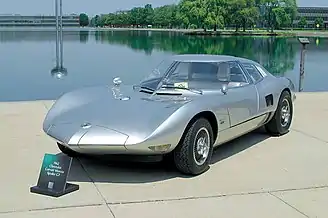Chevrolet Corvair Monza GT
The Chevrolet Corvair Monza GT was a mid-engined experimental prototype automobile built in 1962 and based on the early model Chevrolet Corvair series. As it was essentially a concept car, the Monza GT did not enter production.
| Corvair Monza GT | |
|---|---|
 Corvair Monza GT at General Motors Technical Center in Warren, MI | |
| Overview | |
| Manufacturer | Chevrolet (General Motors) |
| Also called | Monza GT |
| Production | 1962 1 built |
| Designer | Larry Shinoda and Tony Lapine |
| Body and chassis | |
| Class | Sports car (experimental) |
| Body style | 2-door coupe |
| Layout | RMR layout |
| Related | Chevrolet Corvair Monza SS Spyder |
| Powertrain | |
| Engine | 2.3 L (145 ci) Chevrolet Turbo-Air 6 engine H6 |
| Power output | 102 hp (76 kW) |
| Transmission | 4-speed manual |
| Dimensions | |
| Wheelbase | 92 in (2,337 mm) |
| Length | 162 in (4,114.8 mm) |
| Height | 42 in (1,067 mm) |
Design and development
Under direction by Bill Mitchell, the Corvair Monza GT coupe was designed by Larry Shinoda and Tony Lapine in 1962, borrowing from the Bertone designed Testudo concept car. Like the earlier design, the GT doors swung upward and were actually a front hinged canopy that extended into the B section; the rear engine cover also hinged at the rear. The engine was a standard 145 cu in (2,380 cc), 102 hp (76 kW), Chevrolet Turbo-Air 6 engine with two carburetors. Unlike in the production Corvair, the GT engine was mounted ahead of the transaxle, turned around 180 degrees and mounted as a mid-engine layout. The chassis featured a 92 in (2,337 mm) wheelbase, 16 in (406 mm) shorter than the production Corvair. The overall dimensions were similarly reduced with a length of 162 in (4,114.8 mm) and a height of 42 in (1,067 mm).[1]
Besides its streamlined appearance, the Monza GT had innovative features, including magnesium-alloy wheels, 4-wheel disc brakes, 4-wand fixed seats with adjustable pedals. These features would eventually turn up in production cars, years later.[2]
Some of the styling features of the GT, notably the rear end, were the inspiration for the 1965–1969 Corvair. Pontiac Motor Division engineer Bill Collins, the division borrowed heavily from the Corvair Monza GT design when it developed both the coupe and convertible versions of its 1964 Banshee prototype cars. The design would also influence the 1965 Chevrolet Mako Shark II concept car and the 1968–1982 Corvette (C3) that clearly resembled it, three years later.
History
Introduced to the public in June 1962 at Elkhart Lake at a Sports Car Club of America race for A- and B-production classes, the Corvair Monza GT was an instant hit with enthusiasts. Reporters remarked that the car was "gorgeous."[3]
The Chevrolet Corvair Monza GT coupe toured together with the Monza SS (Spyder) in early 1963, making a further public appearance at the New York International Auto Show. Although both cars were fundamentally based on existing Corvair drivetrain components, each represented a development of the Corvair design. In the SS convertible, the engine, with four carburetors, was left in its stock location behind the transaxle, allowing a shorter (88 in (2,235 mm)) wheelbase.
Although the SS came close to series production, both cars ended up as concepts only, tied to the fortunes of the Corvair, which fell after the vehicle had been declared unsafe by pioneering consumer advocate Ralph Nader.[4]
As far as the Corvair Monza GT got was Disneyland, where it was used as the basis for the World of Tomorrow car ride attraction.
Today, the Corvair Monza GT concept car is one of the more than 700 vehicles found in the GM Heritage Collection of historically significant vehicles.
References
- "The 1962 Corvair Monza GT". Chevy Hardcore. 2015-08-19. Retrieved 2018-09-13.
- "1962 Corvair Monza GT Concept Corvette". Super Chevy. 2016-03-31. Retrieved 2018-09-13.
- 2007 Amelia Island Concours d' Elegance at Motor Trend.com Note: Frank Markus for Motor Trend called the GT "gorgeous" in 2007 when it appeared at the Amelia Island Concurs.
- National Highway Traffic Safety Administration (July 1972). "PB 211-015: Evaluation of the 1960–1963 Corvair Handling and Stability". National Technical Information Service. Cite journal requires
|journal=(help) A 1972 Texas A&M University safety commission report for the National Highway Traffic Safety Administration found that the 1960–1963 Corvair possessed no greater potential for loss of control in extreme situations than its contemporaries.
External links
- Ludvigsen, Karl. Corvair by Chevrolet: Experimental & Production Cars 1957–1969 (Ludvigsen Library). Hudson, Wisconsin: Iconografix, 2002. ISBN 978-1-58388-058-6.
